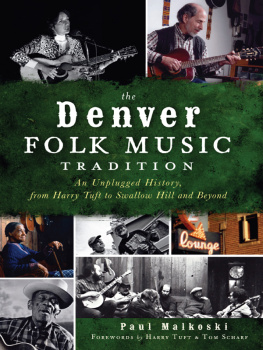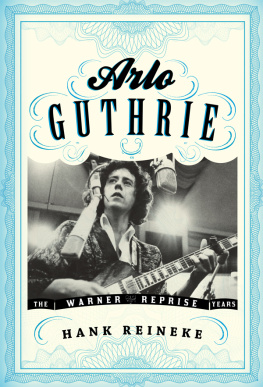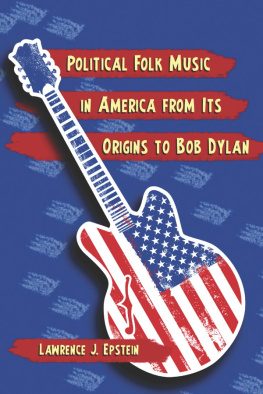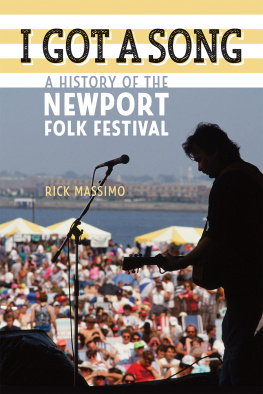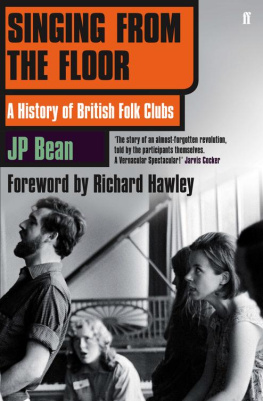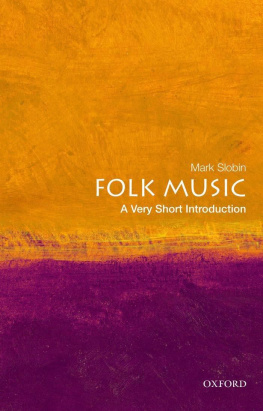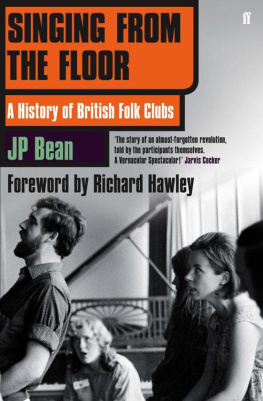SINGING OUT

SINGING OUT
An Oral History of Americas
Folk Music Revivals

DAVID KING DUNAWAY
MOLLY BEER


Oxford University Press, Inc., publishes works that further
Oxford Universitys objective of excellence
in research, scholarship, and education.
Oxford New York
Auckland Cape Town Dar es Salaam Hong Kong Karachi
Kuala Lumpur Madrid Melbourne Mexico City Nairobi
New Delhi Shanghai Taipei Toronto
With offices in
Argentina Austria Brazil Chile Czech Republic France Greece
Guatemala Hungary Italy Japan Poland Portugal Singapore
South Korea Switzerland Thailand Turkey Ukraine Vietnam
Copyright 2010 by Oxford University Press, Inc.
Published by Oxford University Press, Inc.
198 Madison Avenue, New York, NY 10016
www.oup.com
Oxford is a registered trademark of Oxford University Press
All rights reserved. No part of this publication may be reproduced,
stored in a retrieval system, or transmitted, in any form or by any means,
electronic, mechanical, photocopying, recording, or otherwise,
without the prior permission of Oxford University Press.
Library of Congress Cataloging-in-Publication Data
Dunaway, David King.
Singing out: an oral history of Americas folk music revivals
/David King Dunaway, Molly Beer.
p. cm.
Includes bibliographical references and index.
ISBN 978-0-19-537834-4
1. Folk musicUnited StatesHistory and criticism.
2. Folk songs, EnglishUnited StatesHistory and criticism.
3. Oral traditionUnited States. I. Beer, Molly. II. Title.
ML3551.D83 2010
781.6213009dc22
2009034127
9 8 7 6 5 4 3 2 1
Printed in the United States of America
on acid-free paper
Frontispiece: Collector Anne Warner records Frank Proffitt, source of the Kingston Trios first hit song, Tom Dooley, in Pick Britches Valley, North Carolina, 1941.
Photo by Frank Warner, courtesy of the Frank and Anne Warner Collection
This book is dedicated to all those who have heard a good old song,
found its lyrics, and sung it to themselves or anyone else.
Contents
Foreword
Pete Seeger
Singing Out is a story of the links in what I think of as one of the worlds most important chains, namely the chain of peoples singers. Im proud to be one of these links; I hope there are many more links to come. Im glad theres a book about such links.
People give me too much credit because theyve heard me. They dont know about people like Alan Lomax, or Woody Guthrie, and a whole lot of other people. Not to speak of Francis Child, or Cecil Sharp, and so on. And my father. I just happen to be the link that theyve heard of, so they think Im the daddy of it all. Of course this is not true. I look upon Woody Guthrie and Lead Belly, and Phil Ochs, and Bob Dylan, and countless lesser known people as more links in this chain. I look upon poet Taras Shevchenko of the Ukraine, and that fellow in Paris back in the thirteenth centurythe Romantic poet, who lived with the lowlifes of Paris, with the cutthroats, and thievesFranois Villon. Were all part of this chain. People who use poems and songs to help turn peoples heads around. In one way or another. Im still working on it in a thousand ways, and I hope this book can be a contribution to it. I think that songwriting and singing as an art form have generally been looked down on more than they should be.
People think, well the symphonys on a high plane; the novels on a high plane; but I quote Bla Bartk, who said, A song is just a short form thats on just as high a plane of art as anything else. And Id like to encourage more people to be songwriters. Id like it if everybody in the world thought of singing and songwriting as part of their life, just as much as cooking or eating, or tossing a baseball, or swimming. Its something creative you do with words and tunes and friends.
I decided I would be a musician in 1940, when I came back from that summer having supported myself singing in saloons. Id spent the whole summer. Id hitchhiked around, came back in good health. I hadnt had to write home for money, or to telephone home from jail. (Slept in a couple of jails.) I decided Alan Lomax was right: maybe Id better stick with music. I was really enjoying it. I knew Id never starve as long as I could pick a banjo. It was quite a victory.
Music became a device for me to get to meet people. I couldnt have gone into a saloon and ordered a glass of beer and started talking to people; I was too shy. But if I went into a saloon with a banjo in front of me, and they asked me to play, and I got started talking that way, that was fine.
I remember I got Woody Guthrie to teach me five or six of the songs which would get me by.
I said, Woody, what kind of songs will get me some coins if I sing them?
Well, he says, Try Makes No Difference Now, and Be Nobodys Darling but Mine; and a few Jimmie Rodgerss blues cant go wrong.
So I learned half a dozen songs from him, Gene Autry songs, and other ones, and armed with these, I walked into my first saloon, just like he told me.
He said: Now dont start singing right away. Just keep that banjo slung on your back. Nurse a nickel beer as long as you can. Sooner or later someones gonna say, Kid, can you play that thing?
And dont be too eager. Say, Well, just a bit.
Keep on sipping your beer.
Sooner or later someone will say, Kid, I got a quarter for you if youll pick us a tune.
Now you play your best piece.
When it comes to folk music revivals, I have had my doubts. Take a revival song like Michael Row Your Boat Ashore. Here was a song I sang only half well. When you think of how truly magnificent it must have been when done by a bunch of sweating black people rowing ashore from Sullivans Island, from those islands to the mainland, 150 years ago. It must have been an absolutely magnificent thing. The raw voices in the formal sensebut superbly trained voices in the sense that theyd been singing all their lives. Making up new verses and laughing as they think of a new verse to it. Who is Michael? Is it the Archangel Michael? The Michael at the oar? Its full of fluid ambiguity. The sunlight beating down, and the original situation probably would be something unforgettable.
In 1867, Charles Pickard Ware grabbed his pencil and paper and said, I must get this down. And he wrote down as much as he could and then afterward he went around to the singers and said, What verse was that you were singing?
They said, You mean youre writing this down? Wow, well heres what I was singing.
So then his book Slave Songs of the United States comes out and sits on that shelf. Ninety years later Tony Saletan goes through the book page by page. He shrewdly selects three verses out of fifteen or twenty. He teaches the song to me, and I teach it to the Weavers. We went to Carnegie Hall singing it.
Now it comes back to me from numerous schools and summer camps, such a pale wishy-washy piece of music compared to what it was once. And I realize that my own singing of it is kind of pale and wishy-washy, compared to what it was once. It makes me wonder, is it possible to revive folk music? Well, I finally came to the conclusion: yes, it is possible. We can try. All you can do in this world is try. And a good attempt at trying is sure better than never having tried.
Next page

